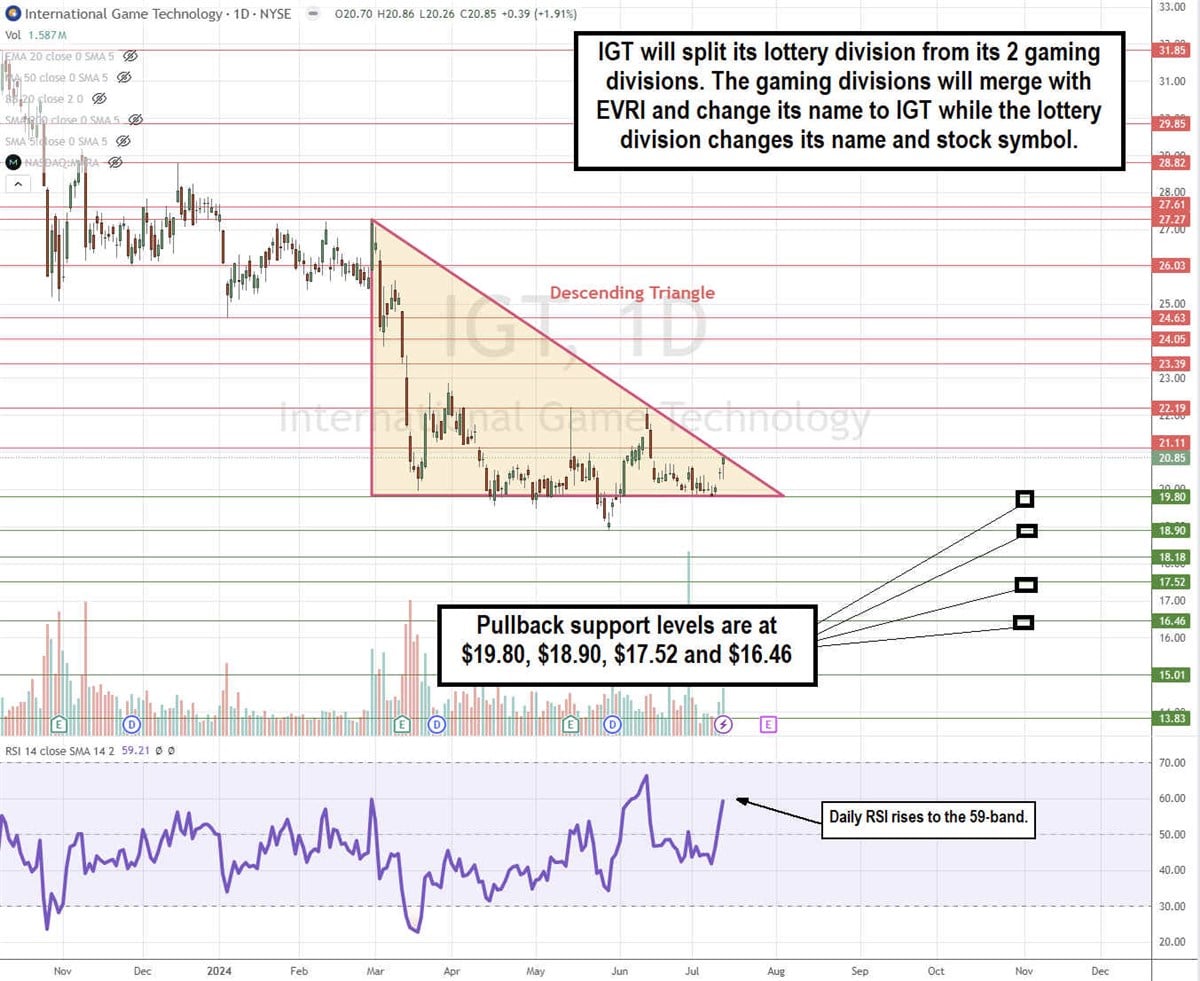Ticker Reports for July 15th
Automaker's Bold Move to an EV Future: Is It Time to Buy Stock?
Ford Motor Company (NYSE: F) is navigating a significant transformation as the automotive sector transitions from gas power and embraces the electric vehicle (EV) future. This shift has led many investors and Ford Motor’s analyst community to wonder if now is the time to buy Ford Motor stock. This uncertainty is understandable, yet a close examination of Ford's recent performance reveals a compelling narrative of resilience, adaptability, and a strategic vision for capturing the opportunities of a changing market. Ford's financial results from recent earnings reports and current metric analysis provide a snapshot of a company confidently navigating this transitional phase.
Analyzing Ford's Current Financial Strength
Ford Motor Company's earnings report for the first quarter of 2024 shows its resilience despite a transformative phase in the automotive sector. Ford generated $42.8 billion in revenue during Q1 2024, representing a 3% year-over-year increase. This top-line growth, particularly notable in the face of industry-wide supply chain constraints and an evolving market landscape, underscores the company's ability to adapt to changing consumer preferences and deliver in-demand vehicles.
Profitability metrics further reinforce Ford's robust financial health. The company reported a net income of $1.3 billion and an adjusted earnings before interest and taxes (EBIT) of $2.8 billion for Q1 2024. Notably, Ford's management has reiterated its full-year adjusted EBIT guidance, projecting a range of $10 billion to $12 billion, indicating a strong belief in its continued ability to generate profits. This optimistic outlook stems from several factors, including robust demand for its new line of gasoline-powered and hybrid vehicles and the anticipated growth of its Ford Pro commercial vehicle and services business.
Furthermore, Ford's current price-to-earnings (P/E) ratio stands at 14.63. This metric, which compares the company's stock price to its earnings per share (EPS), suggests that investors are willing to pay a premium for Ford's future earnings potential. This positive sentiment is further bolstered by Ford exceeding analyst expectations in Q1 2024, reporting earnings per share of $0.49 compared to a consensus estimate of $0.42. This earnings beat has contributed to recent positive momentum in Ford's stock price, signaling growing investor confidence in the company's long-term growth trajectory.
Ford's Strategic Shift into the EV Market
A cornerstone of Ford's growth strategy is its aggressive push into the rapidly expanding EV market. The company is strategically allocating resources to develop and manufacture a comprehensive lineup of electric vehicles, including the F-150 Lightning, Mustang Mach-E, and E-Transit. Recognizing that production capacity is critical to meeting the anticipated surge in EV demand, Ford is significantly scaling up its manufacturing capabilities. This includes forging strategic partnerships to expand its charging infrastructure, such as its recent collaboration with Tesla to provide Ford EV customers access to the extensive Tesla Supercharger Network.
Ford understands that the transition to EVs will be gradual, and the company is investing in a multi-pronged approach. Alongside its EV initiatives, the company is committed to hybrid technology, aiming to offer hybrid versions of all vehicles in its North American portfolio by the end of this decade. This dual focus on EVs and hybrids demonstrates Ford's adaptability and commitment to providing a range of powertrain options to cater to evolving consumer needs. Beyond electrification, Ford is actively exploring other avenues of growth, including developing autonomous vehicle (AV) technologies, positioning itself at the forefront of automotive innovation.
Ford’s Competition and Industry Trends
While Ford is a significant player in the automotive industry, it faces competition from established rivals such as General Motors (NYSE: GM), Stellantis (NYSE: STLA), and Toyota (NYSE: TM), as well as emerging EV-focused companies. Despite this intense competition, Ford's strong track record, particularly in the highly profitable truck segment, provides a distinct advantage.
The automotive industry is currently grappling with various challenges, including supply chain disruptions that have hampered production and increased costs. Like its competitors, Ford must navigate these complexities while simultaneously adapting to evolving consumer preferences and the increasing demand for EVs. Economic conditions also significantly shape the industry's outlook, as recessions or economic slowdowns can directly impact consumer discretionary spending and vehicle sales.
Assessing Analyst Sentiment and Potential Investment Risks for Ford
Recent data points to cautiously optimistic investor sentiment towards Ford despite the market's complexities. While Ford Motor Company’s analyst community currently places a "Hold" rating on the stock with a price target of $14.10, the company's recent positive stock performance is worth noting. Ford's stock has climbed 6.53% in the last five days and an impressive 19.81% in the last month, suggesting growing investor confidence in its prospects. As Ford approaches its upcoming earnings report, analysts are reevaluating the company's valuation. With a high-side price projection of $18.00, there is a potential upside of approximately 25%. This suggests that Ford's stock has room for growth, and investors should monitor the company's performance closely in the lead-up to the earnings report.
However, it is essential to acknowledge the inherent risks associated with investing in Ford. Ford Motor Company’s competition is fierce, especially within the rapidly evolving EV market. Economic downturns pose a significant risk to vehicle sales, as discretionary spending on big-ticket items like cars tends to decline during such periods. Regulatory changes concerning emissions standards, safety regulations, and autonomous driving technology could also impact Ford's operations and profitability.
Ford Motor: A Prudent Investment Opportunity?
Ford could be a compelling investment opportunity for those seeking exposure to the evolving automotive industry. The company's strong financial performance, evidenced by its consistent revenue growth, strong profitability, and healthy dividend yield, demonstrates its resilience in a challenging market.
Simultaneously, Ford is embracing the future of mobility through its ambitious electric vehicle (EV) strategy, developing a comprehensive EV lineup, expanding production capacity, and securing its place in the evolving automotive landscape. While remaining aware of the inherent risks in a dynamic market, Ford's unwavering commitment to innovation, strategic partnerships, and customer-centric approach suggests that now may be an opportune time for investors to consider adding Ford to their portfolios.
The Big Money is Buying THIS… You Should Too!
For the past few months, Bitcoin has been trading flat…
It's been stuck around the $60,000 to $72,000 range.
But that could change soon. Very soon.
Massive Breakout: This ETF Signals Big Gains for Small-Cap Stocks
The iShares Russell 2000 ETF (NYSE: IWM) experienced a significant breakout above multi-year resistance last week, sparked by the release of the CPI inflation data on Thursday. This move was one of the most eye-opening events of the week, drawing significant attention to small-cap stocks.
IWM's Impressive Rally
The iShares Russell 2000 ETF posted an impressive weekly gain of 6.11%, driven by lower-than-expected June inflation data. The CPI declined by 0.1% from May, putting the 12-month rate at 3%, around its lowest level in over three years, the Labor Department reported Thursday. This fueled speculation of potential interest rate cuts. This performance underscores a significant market shift, with interest rate-sensitive small and mid-cap stocks benefiting as investors redirect inflows away from mega-tech names into the broader market.
Impact of Cooling Inflation on iShares Russell 2000 ETF
The iShares Russell 2000 ETF seeks to match the price and yield performance of the Russell 2000 Index, which measures the performance of the smallest 2,000 issuers in the Russell 3000 Index. These small-cap stocks represent the smaller segment of the U.S. equity market.
The recent surge in the Russell 2000 was driven by the latest inflation report from the Labor Department, showing an unexpected decline in consumer prices in June. This cooling inflation has increased market expectations of a Federal Reserve rate cut in September. Lower borrowing costs are particularly beneficial for small-cap companies, which often have higher floating debt levels than larger firms. There is an increased urgency to raise capital to fuel growth and, in some cases, cover operational expenses when they are pre-revenue.
Small Caps Breakout and Leading IWM Performers
The IWM broke above its major $210 resistance zone, which has held firm since 2022. The ETF closed the week with a 6.11% gain at $213.14, confirming the breakout and signaling a significant sentiment and trend shift. If the IWM continues to consolidate above prior resistance, turning it into support, a more stable and higher timeframe trend could emerge, potentially leading to market outperformance for the remainder of the year.
IWM holdings have an aggregate rating of Moderate Buy based on 398 analyst ratings covering 48 companies (12.5% of the portfolio). The aggregate price target for these holdings is $218.95, ranging from $169.38 to $262.21, forecasting just 2.7% upside.
Several IWM holdings experienced notable gains last week. Here are just five of the standout movers:
1. Enovix Corporation (NASDAQ: ENVX): Closed the week up over 13%, with significant upward momentum in recent months. This small-cap company has a high short interest of nearly 30%.
2. Aurora Innovation (NASDAQ: AUR): The stock surged over 26% last week. The $5.74 billion company trades above all major moving averages and has broken its downtrend.
3. Lantheus Holdings (NASDAQ: LNTH): LNTH, a healthcare company with an $8.5 billion market capitalization, was one of the top-performing IWM members last week as shares surged over 56%. The significant gain came after the Centers for Medicare and Medicaid Services (CMS) released a proposed rule that would boost the Medicare reimbursement rate for diagnostic radiopharmaceuticals.
4. Sunrun Inc (NASDAQ: RUN): This $3.8 billion company was one of the top performers of the IWM, soaring over 40% last week and breaking above its downtrend resistance. The stock saw a significant increase in trading volume on Thursday and Friday, adding to its momentum and breakout.
5. Joby Aviation (NYSE: JOBY): This industrial company with a $4.6 billion market capitalization surged almost 28% last week. The positive momentum and surge came after the electric vertical takeoff and landing (eVTOL) company reported a new milestone for its aircraft, completing a massive 523-mile-long eVTOL flight.
The breakout in the IWM and the strong performance of its holdings highlight the potential for continued gains in the small-cap sector, especially as inflation cools and the Federal Reserve considers rate cuts. Investors should watch for continued strength and consolidation above key resistance levels in the coming weeks.
Catalyst Could Trigger 10,000% Price Moves
Are you monitoring 13,217 cryptocurrencies everyday?
If not, you could miss the ONE that can make you wealthy beyond your wildest dreams.
Just take a look:
Major Gaming Stock to Watch: Why It's a Safe Bet Now
International Gaming Technology PLC (NYSE: IGT) provides worldwide electronic gambling, gaming, and lottery products and services. It’s well known for providing most of the slot machines in Las Vegas in the pre-pandemic era. The company has expanded to include digital games through its PlayDigital segment in addition to its Global Gaming and Global Lottery segments. PlayDigital develops online and mobile casino games in established regulated markets. They also partner with established land-based casinos and online gaming operators to include PlayDigital games on their platforms. In February, the company announced a complicated deal to split its Lottery and Gaming divisions.
IGT operates in the consumer discretionary sector, competing with Light & Wonder Inc. (NASDAQ: LNW), Playtech PLC (OTCMKTS: PYTCY) and DraftKings Inc. (NASDAQ: DKNG).
Deciphering IGT’s Division Split with Everi
IGT announced a division split on Feb 29, 2024, between its lottery segment and gaming segments. Its Global Gaming and PlayDigital, which includes online casinos, iGaming and sports betting products, will be split from its Lottery segment. The two gaming divisions will be merged with Everi Holdings Inc. (NYSE: EVRI), a rival gaming technology company, to form a new entity under the International Gaming Technology name and stock symbol in a $6.2 billion deal.
Existing IGT shareholders will own 54% of the combined gaming company and Everi shareholders will hold the remaining 46%. The lottery business will change its name and receive a new stock symbol. The businesses will be separated through a taxable spin-off to IGT investors and merged with Everi. The deal is expected to close by the end of 2024 to early 2025. The lottery unit recently closed a 7-year deal with the Colorado lottery.
The Goal of the Spin-Off Merger
The goals for the transaction are clear. Management has felt that the market has undervalued the company's intrinsic value for too long. It also wants to ensure clarity of focus between the divisions so the lottery business can focus on lotteries and the gaming divisions focus on games. The confusing part of the deal is that the new entity will still trade under the IGT stock symbol and keep the International Gaming Technology name but merge with Everi to become a powerhouse gaming company. The lottery unit will also trade as an independent public company on the NYSE under a new stock symbol and a new name.

IGT Stock is in a Descending Triangle Pattern
The daily candlestick chart on IGT is in a descending triangle pattern. This pattern is comprised of a falling upper trendline connecting the lower highs on bounces, meeting the flat-bottom horizontal lower trendline at $19.80 at the apex. As time wears on, the trading channel between the upper and lower trendlines gets smaller until an imminent breakout through the upper trendline or breakdown through the lower trendline forms. The daily relative strength index (RSI) bounced to the 59-band as bulls attempted to break out again. Pullback support levels are at $19.80, $18.90, $17.52 and $16.46.
Growth Slowing
IGT reported Q1 2024 EPS of 46 cents, beating consensus analyst expectations by 15 cents. Revenues rose 1% YoY to $1.07 billion, beating $1.03 consensus estimates. The strength was carried mostly by its Lottery segment, which was partially offset by its gaming and digital product sales. Operating income of $256 million was in line with the year-ago period. Operating margin exceeded expectations by 400 bps at 24%. Adjusted EBITDA margin was 41.5% on its adjusted EBITDA of $443 million.
Raising Full Year 2024 Forecasts
Based on its robust Q1 2024 performance, IGT raised its full-year 2024 revenue guidance to $4.4 billion, beating consensus estimates of $4.36 billion. However, Q2 2024 revenue expectations were soft at $1.05 billion versus $1.09 billion consensus estimates.
IGT CEO Vince Sadusky commented, "Innovative game, hardware, and systems solutions drove better-than-expected Global Lottery and Gaming & Digital performance in the first quarter.”
Sadusky concludes, "As a result, we are upgrading our full-year 2024 revenue and profit goals, which reflect broad-based momentum across key performance indicators in the balance of the year. We continue to make progress on separating Global Lottery from Gaming & Digital and preparing for the proposed transaction with Everi."
International Gaming Technology analyst ratings and price targets are at MarketBeat. The consensus analyst price target of $28.00 implies a 24.3% upside. There are six analyst ratings for IGT comprised of four Buys and two Holds.




